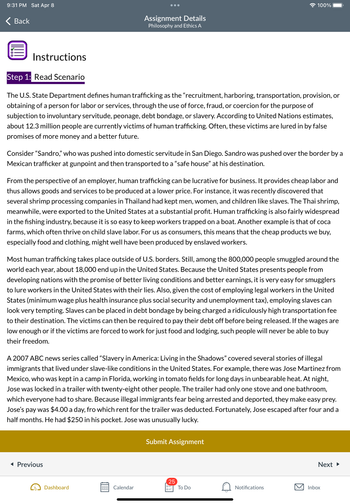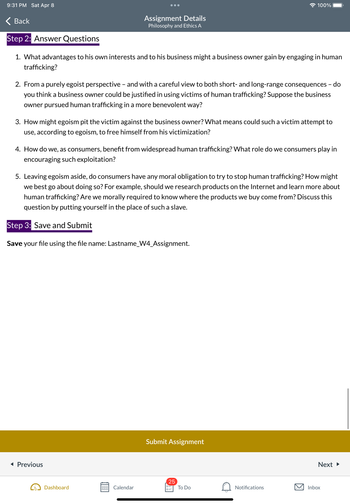
Social Psychology (10th Edition)
10th Edition
ISBN: 9780134641287
Author: Elliot Aronson, Timothy D. Wilson, Robin M. Akert, Samuel R. Sommers
Publisher: Pearson College Div
expand_more
expand_more
format_list_bulleted
Question

Transcribed Image Text:9:31 PM Sat Apr 8
Back
Instructions
Step 1: Read Scenario
The U.S. State Department defines human trafficking as the "recruitment, harboring, transportation, provision, or
obtaining of a person for labor or services, through the use of force, fraud, or coercion for the purpose of
subjection to involuntary servitude, peonage, debt bondage, or slavery. According to United Nations estimates,
about 12.3 million people are currently victims of human trafficking. Often, these victims are lured in by false
promises of more money and a better future.
Assignment Details
Philosophy and Ethics A
Consider "Sandro," who was pushed into domestic servitude in San Diego. Sandro was pushed over the border by a
Mexican trafficker at gunpoint and then transported to a "safe house" at his destination.
From the perspective of an employer, human trafficking can be lucrative for business. It provides cheap labor and
thus allows goods and services to be produced at a lower price. For instance, it was recently discovered that
several shrimp processing companies in Thailand had kept men, women, and children like slaves. The Thai shrimp,
meanwhile, were exported to the United States at a substantial profit. Human trafficking is also fairly widespread
in the fishing industry, because it is so easy to keep workers trapped on a boat. Another example is that of coca
farms, which often thrive on child slave labor. For us as consumers, this means that the cheap products we buy,
especially food and clothing, might well have been produced by enslaved workers.
Most human trafficking takes place outside of U.S. borders. Still, among the 800,000 people smuggled around the
world each year, about 18,000 end up in the United States. Because the United States presents people from
developing nations with the promise of better living conditions and better earnings, it is very easy for smugglers
to lure workers in the United States with their lies. Also, given the cost of employing legal workers in the United
States (minimum wage plus health insurance plus social security and unemployment tax), employing slaves can
look very tempting. Slaves can be placed in debt bondage by being charged a ridiculously high transportation fee
to their destination. The victims can then be required to pay their debt off before being released. If the wages are
low enough or if the victims are forced to work for just food and lodging, such people will never be able to buy
their freedom.
◄ Previous
A 2007 ABC news series called "Slavery in America: Living in the Shadows" covered several stories of illegal
immigrants that lived under slave-like conditions in the United States. For example, there was Jose Martinez from
Mexico, who was kept in a camp in Florida, working in tomato fields for long days in unbearable heat. At night,
Jose was locked in a trailer with twenty-eight other people. The trailer had only one stove and one bathroom,
which everyone had to share. Because illegal immigrants fear being arrested and deported, they make easy prey.
Jose's pay was $4.00 a day, fro which rent for the trailer was deducted. Fortunately, Jose escaped after four and a
half months. He had $250 in his pocket. Jose was unusually lucky.
Dashboard
000 Calendar
000
100%
Submit Assignment
25
0=
To Do
Notifications
Next ►
Inbox

Transcribed Image Text:9:31 PM Sat Apr 8
Back
Step 2: Answer Questions
1. What advantages to his own interests and to his business might a business owner gain by engaging in human
trafficking?
Assignment Details
Philosophy and Ethics A
2. From a purely egoist perspective - and with a careful view to both short- and long-range consequences - do
you think a business owner could be justified in using victims of human trafficking? Suppose the business
owner pursued human trafficking in a more benevolent way?
3. How might egoism pit the victim against the business owner? What means could such a victim attempt to
use, according to egoism, to free himself from his victimization?
4. How do we, as consumers, benefit from widespread human trafficking? What role do we consumers play in
encouraging such exploitation?
◄ Previous
5. Leaving egoism aside, do consumers have any moral obligation to try to stop human trafficking? How might
we best go about doing so? For example, should we research products on the Internet and learn more about
human trafficking? Are we morally required to know where the products we buy come from? Discuss this
question by putting yourself in the place of such a slave.
Step 3: Save and Submit
Save your file using the file name: Lastname_W4_Assignment.
Dashboard
000 Calendar
000
100%
Submit Assignment
25
0=
To Do
Notifications
Next ►
Inbox
Expert Solution
This question has been solved!
Explore an expertly crafted, step-by-step solution for a thorough understanding of key concepts.
This is a popular solution
Trending nowThis is a popular solution!
Step by stepSolved in 5 steps

Knowledge Booster
Similar questions
- Discuss situations where whistle-blowing is seen as an ethical act challengingarrow_forwardA student is considering which jobs to apply for after graduating college with a bachelor's degree. As they research jobs, they discover a company that requires employees to wear designer clothes and drive expensive vehicles before they can be hired. Which core principle of social justice does this scenario violate? Select one. Question 10 options: Access to resources Equity Participation Diversity Human rightsarrow_forwardBased on the nature of justice, choose a proposed political viewpoint and explain how just it is. Apply the Libertarian view to the poverty in America to justify or expose its value. Can wealth legitimately be spread equally among the people of a nation based on the philosophers you have been introduced to?arrow_forward
- The U.S. is more aggressive than other jurisdictions in pursuing criminal penalties for violations of antitrust law. In your view, are criminal penalties justified or could the same goals be served by other approaches, such as greater civil fines for culpable individuals and corporations?arrow_forwardplease help out with these Human Rights Theory questions. only 3-4 sentence would be enough. Assume for now that you accept the distinction between positive and negative rights. Define negative rights, giving one example to illustrate your definition. What is the relationship between state sovereignty and human rightsarrow_forwardDefine or explain each of the following terms. Each response should consist of three or four sentences or several points (point form are acceptable). 1. Protective mechanisms 2. Primary, secondary, and tertiary victims 3. Strobl’s self and other victimization classification 4. Victimology 5. Risk factors for violent victimization 6. Resilience and victimization 7) List and explain the five reasons (discussed in Chapter 5) why we should avoid blaming victims for their own victimization. 8) Chapter 5 describes the differences between victimology and criminology. What are those differences, and how are they manifested in the criminal justice system?arrow_forward
- n your own words, describe the difference between human rights and legal rights.arrow_forwardEmployment legislation during the 1960s included which of the following Acts: Multiple Choice FLSA, FUTA, and FICA. Civil Rights Act, ADEA, and Equal Pay Act. CTPA, FICA, and ERISA. DOMA, FMLA, and PRWOR.arrow_forwardstakeholder theory of primark child labour scandal. principles of corporate rights, principle of corporate effect and stakeholders that were impactedarrow_forward
arrow_back_ios
arrow_forward_ios
Recommended textbooks for you
 Social Psychology (10th Edition)SociologyISBN:9780134641287Author:Elliot Aronson, Timothy D. Wilson, Robin M. Akert, Samuel R. SommersPublisher:Pearson College Div
Social Psychology (10th Edition)SociologyISBN:9780134641287Author:Elliot Aronson, Timothy D. Wilson, Robin M. Akert, Samuel R. SommersPublisher:Pearson College Div Introduction to Sociology (Eleventh Edition)SociologyISBN:9780393639407Author:Deborah Carr, Anthony Giddens, Mitchell Duneier, Richard P. AppelbaumPublisher:W. W. Norton & Company
Introduction to Sociology (Eleventh Edition)SociologyISBN:9780393639407Author:Deborah Carr, Anthony Giddens, Mitchell Duneier, Richard P. AppelbaumPublisher:W. W. Norton & Company The Basics of Social Research (MindTap Course Lis...SociologyISBN:9781305503076Author:Earl R. BabbiePublisher:Cengage Learning
The Basics of Social Research (MindTap Course Lis...SociologyISBN:9781305503076Author:Earl R. BabbiePublisher:Cengage Learning Criminalistics: An Introduction to Forensic Scien...SociologyISBN:9780134477596Author:Saferstein, RichardPublisher:PEARSON
Criminalistics: An Introduction to Forensic Scien...SociologyISBN:9780134477596Author:Saferstein, RichardPublisher:PEARSON Sociology: A Down-to-Earth Approach (13th Edition)SociologyISBN:9780134205571Author:James M. HenslinPublisher:PEARSON
Sociology: A Down-to-Earth Approach (13th Edition)SociologyISBN:9780134205571Author:James M. HenslinPublisher:PEARSON Society: The Basics (14th Edition)SociologyISBN:9780134206325Author:John J. MacionisPublisher:PEARSON
Society: The Basics (14th Edition)SociologyISBN:9780134206325Author:John J. MacionisPublisher:PEARSON

Social Psychology (10th Edition)
Sociology
ISBN:9780134641287
Author:Elliot Aronson, Timothy D. Wilson, Robin M. Akert, Samuel R. Sommers
Publisher:Pearson College Div

Introduction to Sociology (Eleventh Edition)
Sociology
ISBN:9780393639407
Author:Deborah Carr, Anthony Giddens, Mitchell Duneier, Richard P. Appelbaum
Publisher:W. W. Norton & Company

The Basics of Social Research (MindTap Course Lis...
Sociology
ISBN:9781305503076
Author:Earl R. Babbie
Publisher:Cengage Learning

Criminalistics: An Introduction to Forensic Scien...
Sociology
ISBN:9780134477596
Author:Saferstein, Richard
Publisher:PEARSON

Sociology: A Down-to-Earth Approach (13th Edition)
Sociology
ISBN:9780134205571
Author:James M. Henslin
Publisher:PEARSON

Society: The Basics (14th Edition)
Sociology
ISBN:9780134206325
Author:John J. Macionis
Publisher:PEARSON